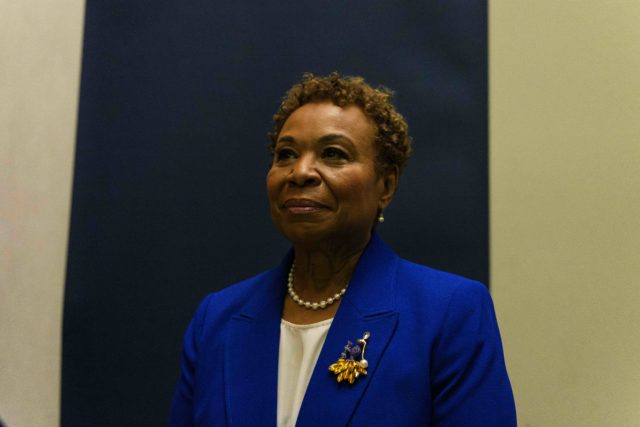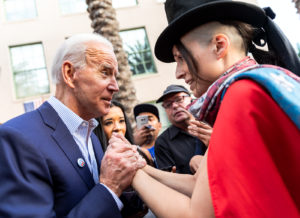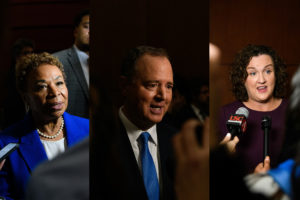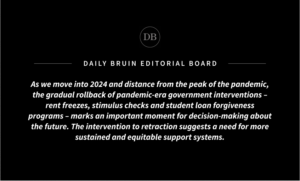This post was updated Feb. 11 at 10:44 p.m.
Rep. Barbara Lee, one of four major candidates for the open United States Senate seat in California, sat down with Matthew Royer, the Daily Bruin’s national news and higher education editor, to discuss her candidacy, her accomplishments in Congress and why she believes she is the most qualified to serve in the position.
The primary election to replace Sen. Laphonza Butler – whom Gov. Gavin Newsom appointed to replace the late Sen. Dianne Feinstein – will take place March 5. The top two finishers in the election will advance to the Nov. 5 election, which coincides with the 2024 Presidential Election.
This interview has been edited for length and clarity.
Daily Bruin: What makes you the best candidate for the U.S. Senate in California?
Rep. Barbara Lee: I hope people would consider, in terms of my being the best candidate for California, is my experience as a legislator, appropriator, negotiator and being able to bring home federal dollars to help make life better for everyone in California given the affordability crisis, given the cost of living, given the wage gap, and I have a history of fighting for what’s right. And also being a persistent and consistent progressive voice.
It’s important to have my voice in the Senate because my lived experiences connect in so many ways with those 20 million who are living one paycheck away from poverty. For example, I was on public assistance, Medi-Cal, food stamps, raising two boys as a single mom. As a single mom, I didn’t have money for childcare because it was too expensive then. I had to take my kids to class with me. Fast forward to today. Childcare is a big issue in terms of the affordability crisis, and I want to be that voice at the table to fight for families who need the help with childcare. I’ve fought to expand the Child Tax Credit, lifted people out of poverty and the perspective and the lens that I bring to the Senate is missing.
DB: An important issue for UCLA students is student loan debt. If elected to the Senate, what is your plan to tackle the issue?
BL: I’m going to keep fighting in the Senate to cancel all student loan debt. Also, I will support Sen. Bernie Sanders’ (bill) – which I support in the House now, but try to get it passed – where we make public higher educational institutions tuition-free, and I think that’s absolutely necessary.
DB: A portion of the UCLA student body is made up of Dreamers and students without legal immigration status. If elected, what is your plan for the undocumented youth in this country?
BL: I plan to fight hard to make sure not only do our Dreamers have a pathway to citizenship, but also their families.
In addition to fighting for this pathway to citizenship, I would fight to make sure that student Dreamers have access to internship and fellowship money to be able to work in congressional offices. The Senate can pay interns, but we’re not allowed to pay Dreamers.
That’s just one small measure I would fight for, but ultimately, it’s passing all of the legislation – the DREAM Act and the bills that, of course, Sen. (Alex) Padilla is working on. But I would also help organize to make sure that other senators supported the pathway to citizenship for Dreamers and their families.
DB: Another issue that students and Californians alike are tackling right now is housing insecurity. If elected, how would you work to ensure that Californians can live and stay in the state?
BL: We have to make housing designated as critical infrastructure, just like bridges, just like roads. We invest in infrastructure. We need to invest in housing as infrastructure.
There are several things I would do. First of all, we need a national eviction protection policy, which I support. Secondly, we need to support bills like the End (Ending) Homelessness Act – where Congresswoman (Maxine) Waters has this bill, but we must make sure that people who are low-income have a chance to live in safe affordable housing without being evicted and my DEPOSIT Act, I will champion in the Senate, which requires HUD (U.S. Department of Housing and Urban Development) to develop a fund that would provide for first and last month’s rent and security deposit.
In California, you’re talking about $2,500, $3,000 a month for rent, plus a security deposit. How in the world can a family move into a place with $10,000 or $15,000 upfront? That’s just impossible with the wage gap. In the Senate, I was fighting to get my DEPOSIT Act passed so that young people and families can go to their government and get the security deposit and first and last month’s rent. That’s a small measure, but it’s a big deal.
Also, when you look at how we deal with people who are unsheltered, we need to make sure we have mental health services and support services and make sure that we help people get off the streets quickly. … You can’t just tell people, “Here, I got a place for you to live.” You have to be able to have the counseling and the support services there.
We’ve got to change the policies that allow unsheltered people to be designated as criminals and be arrested because the criminalization of unsheltered people is a moral disgrace, and that’s what’s taking place now.
DB: In the U.S. over the past two decades, voting rights have been contested in courts. If elected, how would you aim to protect the right to vote?
BL: The first thing we need to do is end the filibuster so that we can pass the John Lewis Voting (Rights) Advancement Act. There are other bills that provide for voter protection, easy access to the ballot box, but also we need to get money out of politics and ensure that we overturn Citizens United and pass public financing of campaigns. It all intersects with each.
Many states, for example, have put up so many barriers to voting, for young people, for senior citizens, for people of color, for disabled people – the federal government has to step in and exercise all of the civil rights laws that we have to tell states, “No, this is wrong, and it’s undemocratic.” We can’t do that until we get the John Lewis Voting (Rights) Advancement Act passed.
DB: Climate change is a large concern on college campuses, and there are many student organizations dedicated to the cause. If elected to the Senate, what is your plan to tackle climate change?
BL: Early on, I took the no fossil fuels pledge. In terms of my campaign, I don’t take corporate money, but I also took the pledge to end fossil fuels. Also, I support a Green New Deal. I’m an original co-sponsor of the Green New Deal.
It’s important that we ban offshore drilling, and we raise taxes on corporate polluters, and we fight for environmental justice policies which are included in the bill I co-sponsored, the Donald McEachin Environmental Justice (For All) Act.
I grew up in El Paso, Texas, in a community where it was a Black and brown community, and a smelter was located close by that emitted chemicals. The health impacts in our neighborhood were just very prevalent and very sad, so environmental justice is a big deal for me. In the Senate, I would work to pass all of the environmental justice bills, but also making sure that the climate crisis is declared an emergency, which I’ve written to the president about already. But I would fight in the Senate to get more senators to be on record declaring it an emergency but making sure that those who are activists, and who understand why climate justice is important, that they have a seat at the table.
You don’t hear much about environmental justice being debated in the U.S. Senate. I intend to be that champion to do that.
Finally, we have to look at how workers, and the oil industry and fossil fuel industry, how there’s a just transition for our brothers and sisters who are in labor unions, making sure that as we transition to a green economy that they have workforce development, job training in conjunction with keeping their salaries, their benefits of their retirements – because you just can’t take an employee who’s had years of work in the fossil fuel industry and cut them loose.
DB: You’ve called for a permanent ceasefire in Israel and the Gaza Strip. Can you elaborate on your position?
BL: I called for a permanent ceasefire because I know that’s the only way the hostages will be released, but this catastrophic killing of civilians, the dismantling and destruction of Gaza? That’s the only way we’ll get to it. This is becoming a moral catastrophe also. What’s taking place is counterproductive to Israel’s security.
Early on, I condemned the Hamas attacks and always will. Israel, Israelis, deserve to live in peace and security and not have to worry about nor be threatened by Hamas or any other terrorist groups.
As the war continues, that’s not going to be conducive to getting the hostages free. In this race, I’m the only candidate that called for a permanent ceasefire early on. And I do know that part of what I’m talking about is historical for me because I was the only one who voted against the authorization to use force when (former-President) George Bush put it forth, right after the horrific attacks of 9/11. And I said then, like I say now, it could spiral out of control and develop into a broader, longer war, which it did. Now you see what’s happening here, in the Middle East, the United States is becoming more embroiled, this is escalating, and it has to be contained.
Sometimes you have to pick up the position and stay there, and talk to people and educate people. I’ve been to the Middle East many times. I have a very deep and broad background in foreign policy and national security issues, and I know what I’m talking about. California does not need a senator who’s on-the-job training with regard to foreign policy and international relations.





Comments are closed.